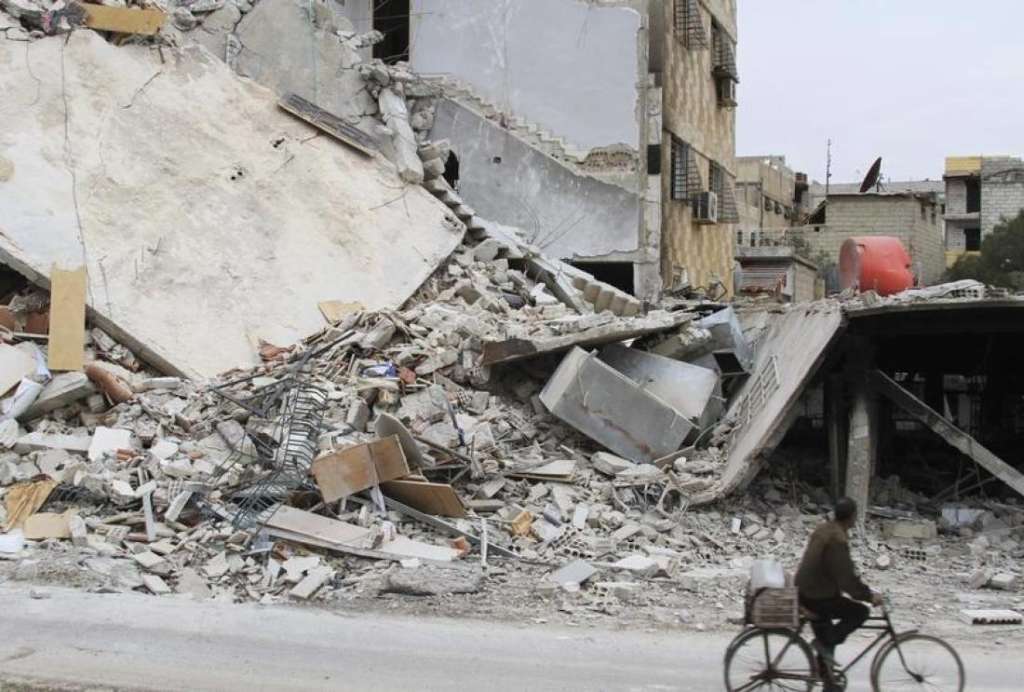Syrian regime troops backed by Russian air power moved to within 25 km of an ISIS-held town in Raqqa province on Tuesday as U.S.-backed militias captured more territory from the group near the city of Manbij in Aleppo province.
The offensives both got underway last week and are targeting ISIS in areas of major strategic importance to its foothold in Syria, where it controls swathes of land up to the Iraqi border.
The Syrian regime forces’ advance into Raqqa province is initially targeting the ISIS-held town of Tabqa, according to the Syrian Observatory for Human Rights and pro-Damascus media sources.
Raqqa province is a major base of operations for ISIS and home to its de facto capital, Raqqa city.
Syrian state-run TV station Ikhbariya said on Tuesday the Syrian air force had targeted ISIS positions south of Tabqa in the Rasafa area, destroying vehicles equipped with machine guns.
A military source told Reuters on Monday the army had advanced to the edge of Raqqa province, from where it could move in several directions against ISIS.
The Observatory, citing its activists on the ground, said ISIS had sent arms and fighters from Raqqa city to Tabqa.
The separate U.S.-backed campaign that got underway last week aims to dislodge ISIS from its last foothold at the Syrian-Turkish frontier and shut off its main access route to the outside world for material and manpower.
It is being fought on the ground by militias including the Kurdish YPG and allied Arab groups, which together formed an alliance last year known as the Syria Democratic Forces.
Sharfan Darwish, spokesman for the Manbij Military Council that is part of the U.S.-backed force, said: “We are advancing on all fronts of our assault.”
He said his fighters now control two new villages.
The Britain-based Observatory, which monitors the Syrian civil war, said SDF fighters are now about two kilometers south of Manbij.
The Observatory said SDF has captured 52 villages and farms since the offensive started.
Meanwhile, U.N. spokesman Ahmad Fawzi told a regular U.N. briefing in Geneva that the world body is still waiting for Syrian regime agreement for an aid convoy to enter the besieged town of Daraya.
“The blockage of aid is a political issue,” Fawzi said. “Daraya is 12 km (7.5 miles) from Damascus, so it can be done but we need the political go-ahead from the government.”
Last week Syria’s government, under pressure from its ally Russia and other countries belonging to the International Syria Support Group overseeing the peace process, allowed the first U.N. aid convoy into Daraya since late 2012.
It brought baby milk and medical supplies to support an estimated 4,000 civilians, just in time for Syria to meet a Thursday deadline to improve aid access or face having aid deliveries imposed by air drops.
But the convoy took no food to Daraya, where the U.N. has said malnourished children will die without outside help. U.N. officials had hoped food would arrive in a second convoy on Friday, but that was delayed with no government approval.
Jens Laerke, spokesman for the U.N. Office for the Coordination of Humanitarian Affairs, said the government had later given partial approval for the food convoy.
“That is not good enough,” he said. “We are reverting to the government.”
Syria’s opposition says the government approved the first convoy in a cynical ploy to alleviate international pressure.
